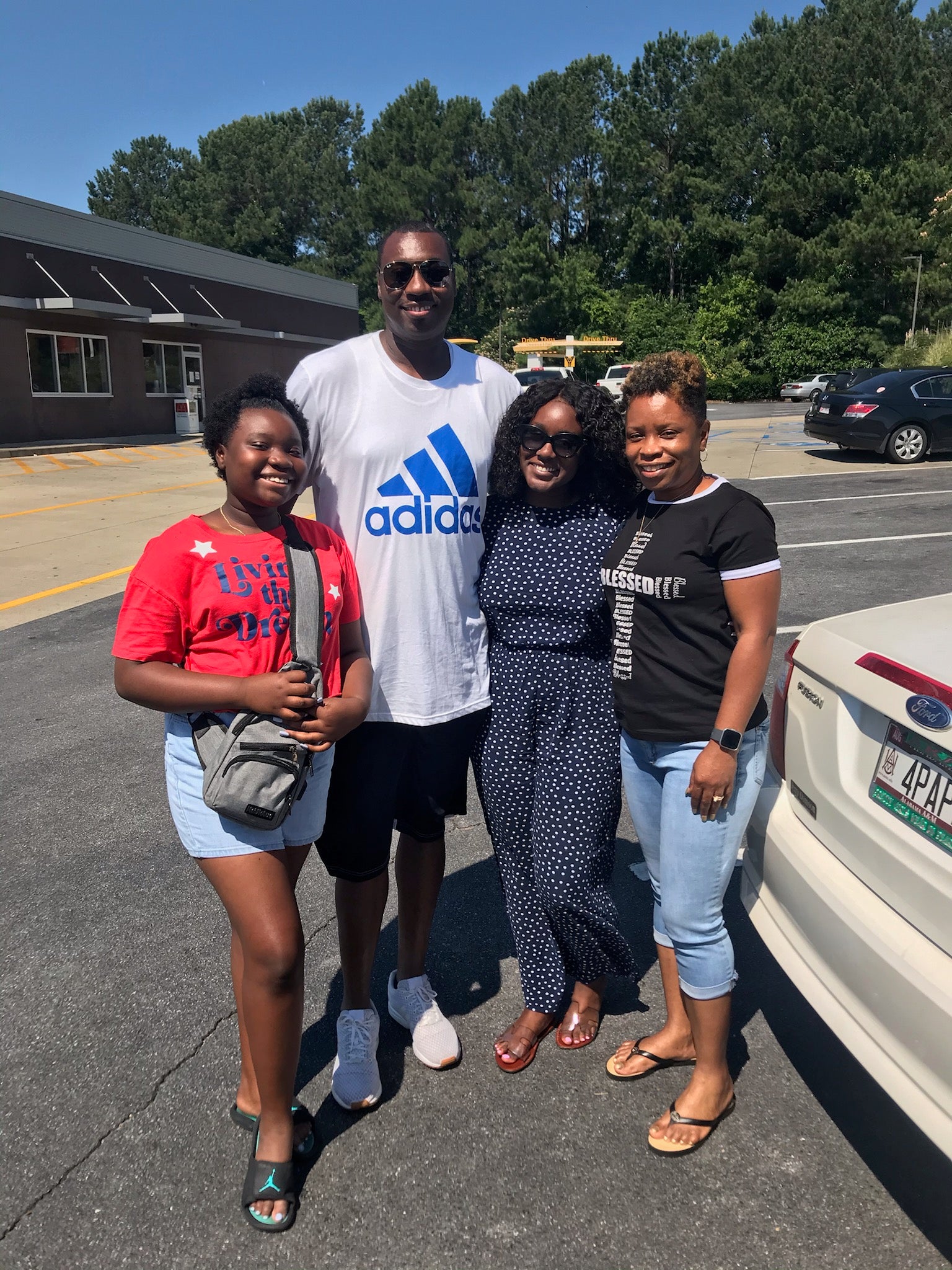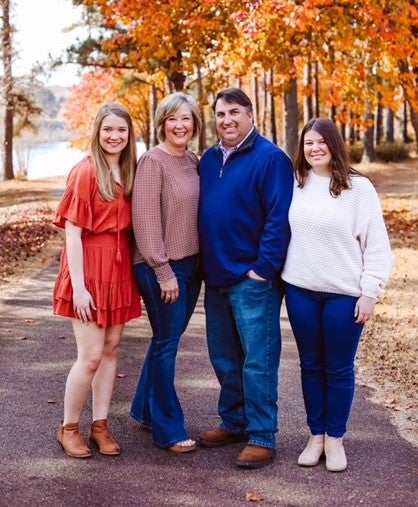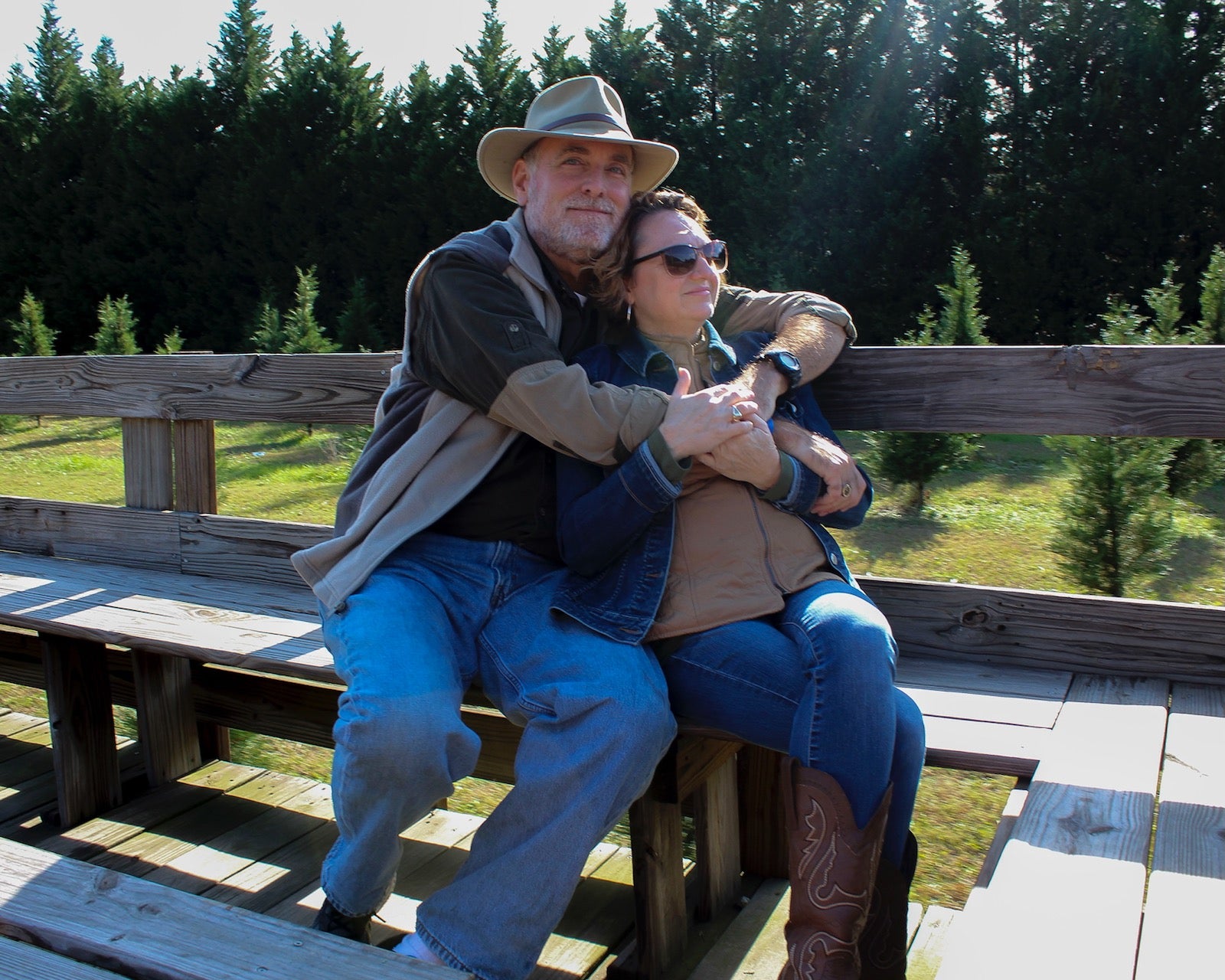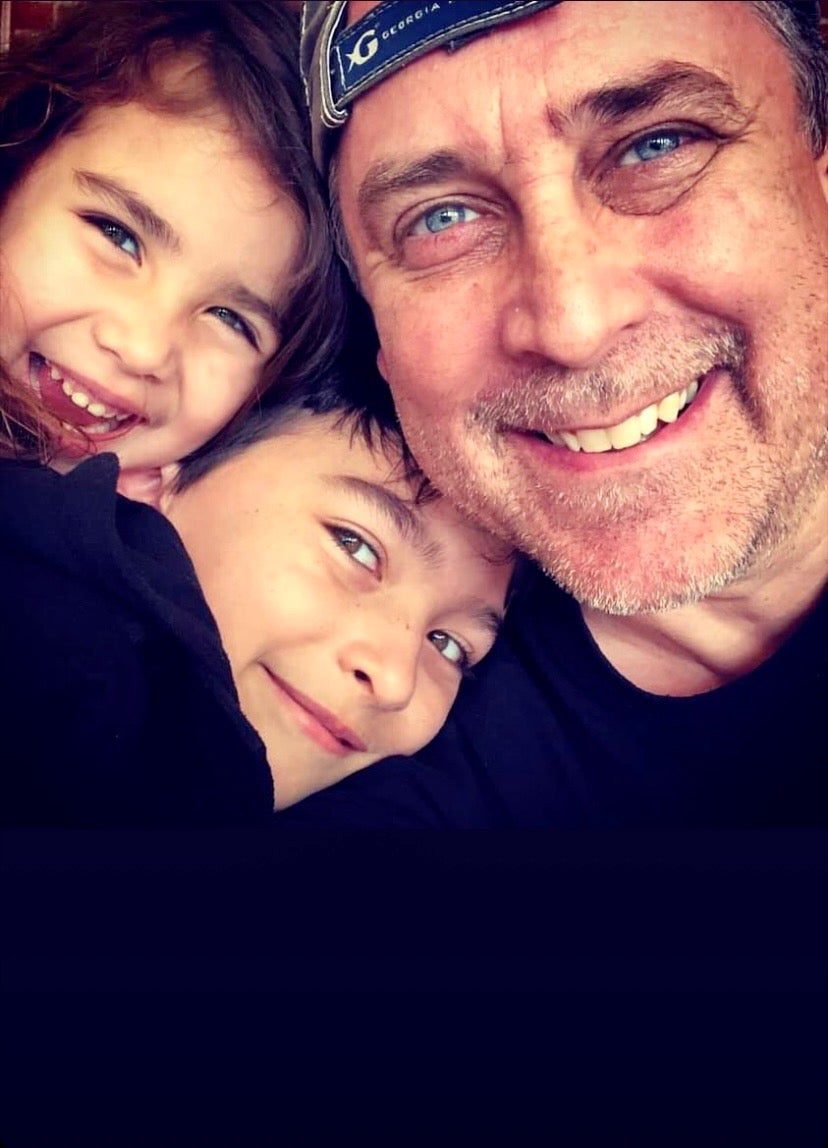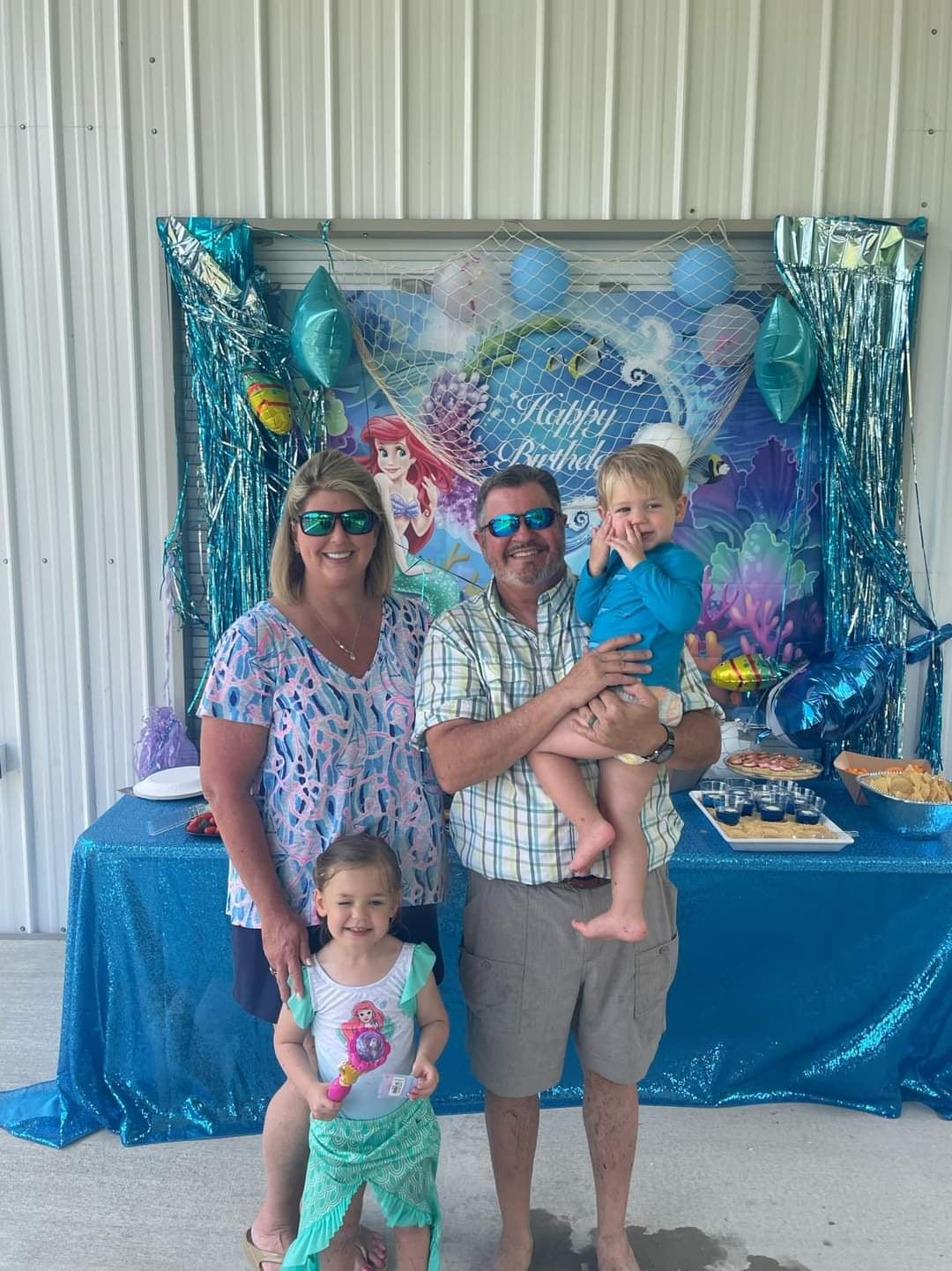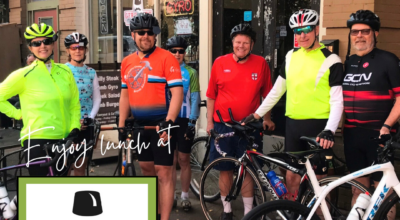A man’s adventure: A role only he can play
Published 12:14 pm Tuesday, June 14, 2022
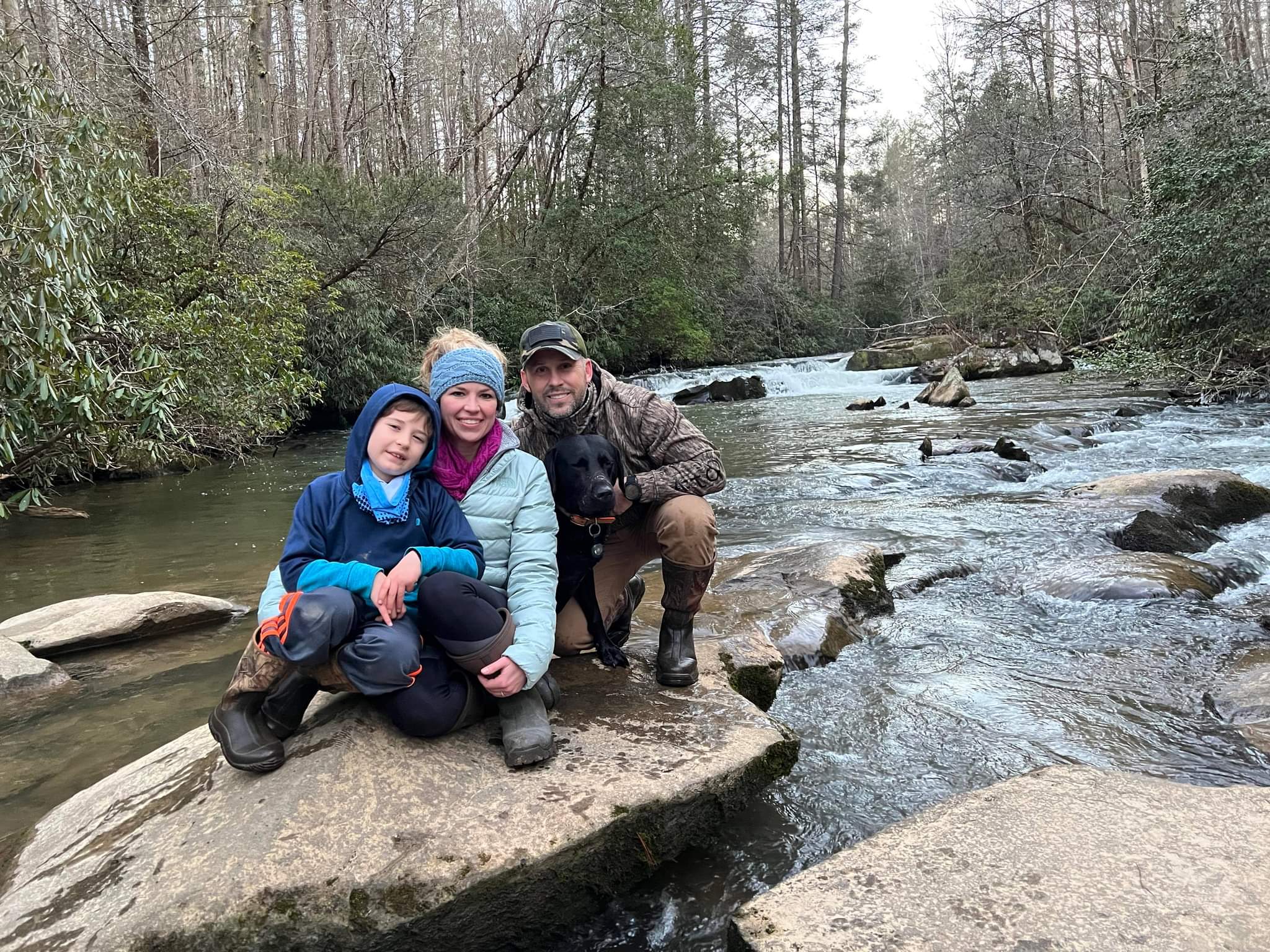
- The Stinchcums enjoying the outdoors, just like David likes it. L-R, William, Anna and David
|
Getting your Trinity Audio player ready...
|
With fathers’ day coming up, we sought out the voices of men. We need a word from men, as they are so vital to who we are as individuals, as a family, as a community, as a nation and as a world. There is a place at the table which is specifically reserved for a man. To ignore this fact is to lose something precious, something needed. The research is plenty on the role men play in our society. We can see what happens when men don’t show up. We can also see what happens when a man is intentional about playing the role only he is designed to play. It is joy to be on the receiving end of good, healthy and robust masculinity. It is vital our men step up for us in the best way they know how. It matters, it matters deeply.
We all bear God’s image. What is it like to bear that image as a man? The Americus Times Recorder first put out a call for our community to point us in the direction of men from whom we needed to hear. Then we invited these men into conversation. The questions were not easy. They would demand the men sit with them and be thoughtful over them. What we received back was golden. It is a celebration of the masculine. We asked our friends to speak on fatherhood, but we realize fatherhood is but one view of what is like to be a man. These men, who we walk around with every day, came through. It is our privilege to share them with you.
The men nominated for this project were more numerous than what is represented here. However, the men represented in this part of our series include Stephen Woodson, David Stinchcum, Eric Bryant, Gabe Jacobs, Mark Scott, Don Gilman, Tom Lorenz, and William Rooks. All of these men have significant women in their lives, have children, two of them have grandchildren, and they are all heavily invested in this community, both personally and professionally. First, it should be noted these men were humbled by the fact someone thought them worthy of speaking on this topic. Second, they wanted you to know they are by no means an expert on everything masculine, they could only speak to their own experiences. They would want you to know they are working this out every day, and some days are much easier than others. It is important for you to know there is no perfection here, nor is any claimed. These men are ordinary in many ways, but yet spectacularly unique to speak on what they hold dear, and the very specific role God has intended them, and only them, to play. They attempt to deliver daily, because they know if they don’t show up as themselves, then the role goes unfulfilled, and something is left wanting. There is no doubt they too would admit a dire need for you to play the role you were created to play. When you come to the table bringing what only you can bring, there is excellence. The world needs nothing short of your particular brand of excellence.
Americus Times Recorder (ATR): As a man, what type of influence do you hope to have on the everyday people in your life? What kind of influence do you hope to have on your son(s)/daughter(s) and wife? How do you go about practicing that influence?
David Stinchcum: I want the people I cross paths with every day to know that they matter to me. I want them to experience kindness during our time together. I want to point my son to Christ. I want him to see all my actions and reactions point to Jesus. I want to be the person my wife runs to no matter the situation.
Eric Bryant: Always I hope to influence through being respectful, responsible, upright, and honest. I try to exhibit these qualities in my daily walk. I make sure these principals guide my every step.
Gabe Jacobs: As a man, I want to be an encourager and one who speaks truth (the good, the bad and the ugly) to those in my everyday life. I hope to be someone whom people can trust and who shows up consistently. The world seems to be directed towards an attitude of every man for himself. Kids these days do not see the influences of men the same way I did as a kid. They get mixed messages from a culture that values “truth” which changes according to individual perspectives. But that’s not real truth. Eventually believing the illusion that the world changes according to their emotions will lead them to confusion and hurt. With my family, I want my daughters and my wife to know that I am on their side. They need to know that I am their protector, comforter, and provider. I want to constantly pour into them, so they know their value and have a special purpose. As for my son, I pray that I lead by example and teach him how to be a manly man who loves God and stands for truth. I want him to become a man who will one day love and serve his family to the purposes that God has for him also. Baseball played such a huge role in my life, and I am finding it continues to this day. I am mirroring coaching styles while adding my own twist into it, trying to influence today’s ball players. My goal is to invest in the kids in our community to show them they are important. It is my goal to teach them how to play the game and be respectful to those involved. It is not all about wins and losses. Its focus has to be about building character and teaching how to manage success and deal with failure. If kids can learn to be good teammates and encourage each other on the field, they have a chance to carry that over to their everyday life. Our world is in desperate need of more people like that. Our coaches have so many opportunities to pour into kids. It is vital we as men conduct ourselves in a manner we want our kids to imitate. Sometimes we get caught up in the moments, but we must show self-control, respect for authority and lead by example.
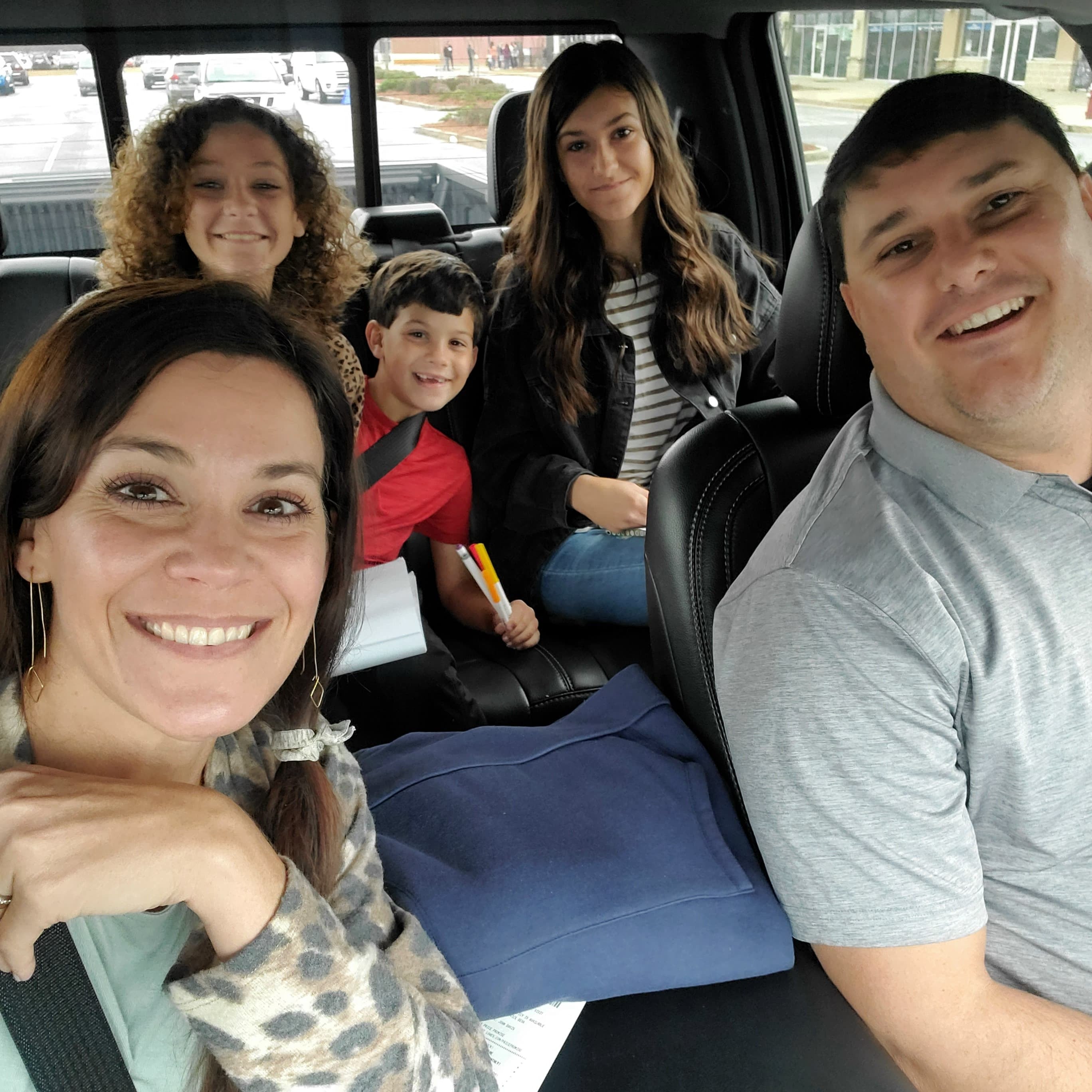
Cruising right along with the Jacobs family, Front seat: Courtney and Gabe Jacobs, back seat L-R: Taryn, Cavan and Brenna
Tom Lorenz: I have the powerful responsibility to have influence on a son and a daughter. Both need me as a good role model in different (and some similar) ways. I need to show them how to be strong, because the world does not pull punches. And yet I need to show them how to be caring, because the world needs more love. I have to show this by my own actions and how I deal with adversity. I find the time to pause and explain to them why I choose certain battles in life and leave others alone. To be honest, I don’t always need to pause. Children watch what you do very closely!
William Rooks: When you are a teacher and a coach you find that you live your life in front of people each and every day. When you are teaching, you have an audience, after school when you are coaching you have an audience, and when you get home your family is your audience. It is my prayer every morning when I wake up, I will set a Godly example that day. It starts by staying in the Word of God. I find when I am constantly reading my Bible and studying, I set a much better example than when I don’t. My family knows me better than anyone. It’s imperative I lead them in a godly manner, and when I don’t, it is imperative they see me ask forgiveness and admit when I fail.
Stephen Woodson: As a man, I aspire to carry myself and live in a way that is pleasing not only to my family but to our community as well. It is my desire to be a servant leader who makes a positive impact on my community through continued involvement in my local church, serving on a variety of community boards and assisting with the needs of families and children. In doing this, I realize my first responsibility is to serve my own family. I have learned this is my first ministry. I pray through my demonstration of servanthood and the way I lead our family, my children will learn to lead their families in the same manner, and in doing so, improve their communities.
Mark Scott: My goal through most of my adult life has been to have a positive impact on the world and make things better wherever I happen to be. As a dad that translated into being supportive of all three kids in whatever endeavors they chose, loving them without condition and challenging them to push beyond what they believed they could be or do. As a husband I’ve tried to be supportive of Julie in whatever she attempts in life, to listen more than I talk, and to provide assistance when asked without always trying to fix things. I haven’t been all that successful on the last two, but she’s put up with me for 35 years now, so she must see that I’m making an effort.
ATR: When you look around our community, where do you see men being very successful? Can you identify an area which needs a more prominent masculine presence? For those who want to make a difference where is the starting line and what is the first step?
David Stinchcum: I believe with all my heart we need more men to volunteer to work with elementary / teenagers in our churches. Too many Sunday school classes, Wednesday night activities and church events are lacking a masculine presence. What does that teach our children? Does the next generation see men eager to teach balls and strikes but not the word of God? First Step is just show up, the need is great. The opportunity is greater.
Eric Bryant: Here in Sumter County, I see men that are law abiding, working hard, and providing for their families and community. It starts in our homes first. Then we continue in the educational systems, places of faith, and in the streets we live. First, we take ownership of the fact we are men and step up and take responsibility.
William Rooks: I love our community, but like all communities there is always room for improvement. As men, we need to do a better job being present. We need to be present in our homes, we need to be present in our churches, and we need to be present in all areas of our community. I love what people like Coach Dwight Harris are doing. His basketball league brings the community together and shows men make a huge difference in our community. One guy I really look up to is Tim Estes, our recreation director. He along with his staff have to beg for coaches every year in their recreation department. I can’t think of a better way for men to start mentoring the next generation than to volunteer in the Sumter County Recreation Department. Every year, they should have so many people volunteering to be coaches, they have to turn people away.
Stephen Woodson: Although success can be looked at in a variety of ways, I believe success is evidenced in a man who realizes his role in this world. This man is someone who cares about the image they portray, and the impact they make in their community. This man takes his responsibilities serious no matter what role he plays whether it be as a husband, father, leader, or supporter. He is someone who wants to see the community prosper no matter the sacrifice. There is a great need for mentors. Because of a lack of guidance, our young men and women show very little respect to their elders, are committing violent acts, and have children at a very young age. In my opinion, we need more prominent masculine presence in the house of worship so these young people can see men who lead their families and communities based on a spiritual foundation.
Mark Scott: There are successful men all over Americus and Sumter County. Everywhere I go in this community I see men who are actively working to make this a better place to live. I see men who are very successful in their work lives and invest much of their time and money back into the community. I see men across this community who serve their churches with faithfulness and humility. I see men volunteering their time to work with youth and children through volunteer organizations and through church programs. There are strong healthy families in every area of town led by committed couples and by single parents. As a police officer, I also see a lot of broken families and teens and children with little to no support or supervision. I see these kids turning to gangs desperately searching for a sense of family. I see kids with no real home, who float from place to place and relative to relative, laying their head wherever they happen to end up each night. I think this is the starting point, midway point and finish line for anyone who truly wants to make a difference in the future of our community. We need men and women who are willing to commit their time and love to reaching these forgotten children with recreation and educational programs and with foster care.
ATR: What does a true masculinity look like?
David Stinchcum: As a father of a seven-year-old son, right now I want to model masculinity somewhere between Superman and Billy Graham. No fear and no compromise.
Eric Bryant: Honest, upright, and involved in the world, especially his community. That is what masculinity looks like.
Tom Lorenz: In my opinion, true masculinity is being strong and calm when everyone else is not. I think it involves doing things you don’t want to do, that aren’t popular, because you know they will help the ones you love. I think true masculinity involves integrity and faithfulness to those you love, to be a rock in the storm.
William Rooks: We don’t have to wonder what true masculinity looks like. All we have to do is model our life after Jesus. Jesus was the perfect example of servant leadership. Men should lead by serving. We should serve our churches, our families, our schools, and our communities.
Mark Scott: I think true masculinity looks like men who project strength through humble service and love. It has nothing to do with outward appearance and everything to do with inward character. Both Old and New Testament scripture is filled with examples of strong godly men who changed the world by humbling themselves and serving. The ultimate example of true masculinity is Christ, who “being found in appearance as a man, he humbled himself by becoming obedient to death— even death on a cross!” Philippians 2:8 (NIV)
ATR: John Eldredge states, “Validation comes to us in two ways: through trials we overcome, and through the words of older men.” Is he right, and will you share something you overcame or the words of an older man that proved you “have what it takes”?
Don Gilman: The trials we face as men come to us through many different scenarios; careers, relationships, finances. Our experiences going through these trials are what “validate” us. An older man once told me when I was faced with a difficult situation “What doesn’t kill you, will make you stronger”. After some thought, I realized he was right. The trials we face in life (of our own doing or someone else’s) gives us validation, if we are willing to accept it. That’s not to say you won’t come out of the trial, bruised, battered, or scared. But those experiences and our rationalizing the event, gives us the validation to understand we can face a trial and cultivate some “wins” from it. Also, the mentorship from an older man (whether it is dad, granddad, uncle, cousin or just a close friend) is a tremendous resource in earning validation of having “what it takes” to weather the storms of life. If you seek the wisdom of an older man, chances are he can give you the advice that is needed to navigate crisis. I think where most men fail is they are impatient in wanting a resolution. Time has to be an element that one has to make peace with.
Eric Bryant: I agree with that statement, and of course I have been blessed to have so many men in my life that were positive and influential.
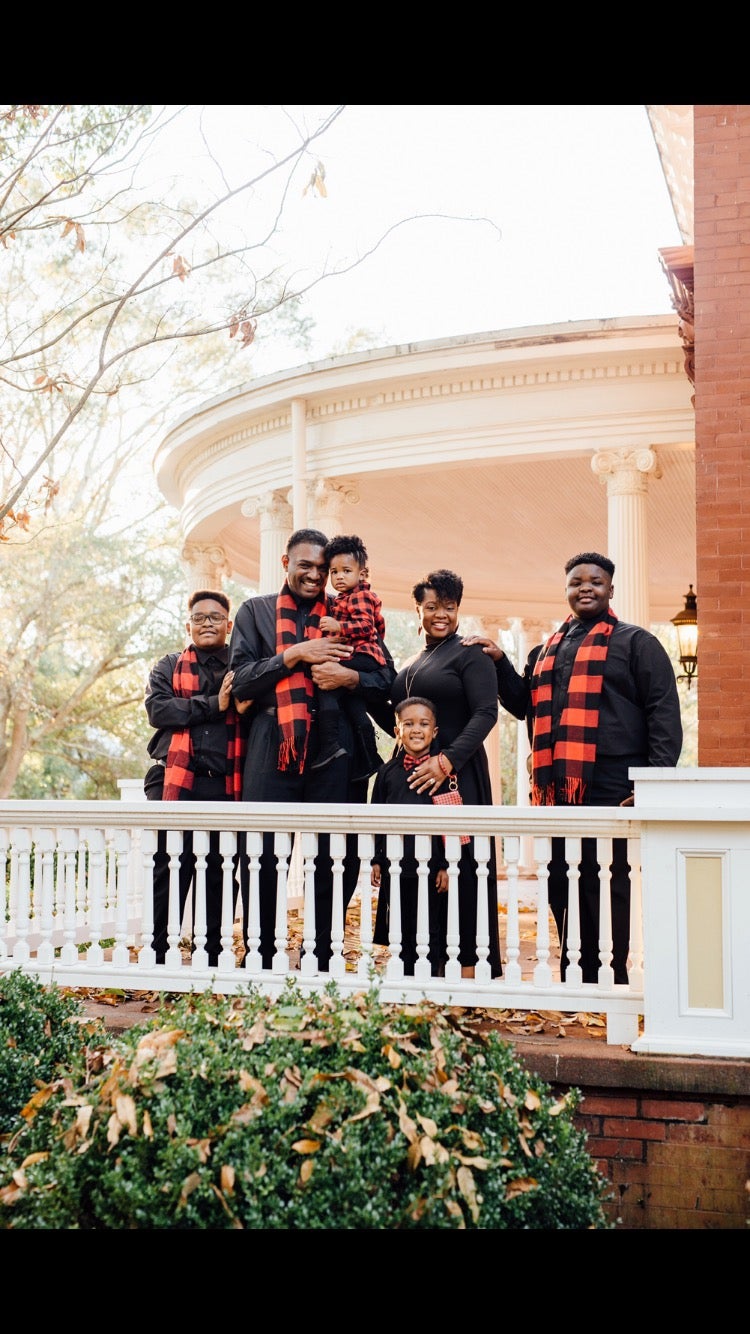
The Eric Bryant family, L-R, Eric, Jr, Eric holding daughter Hailey, Harrison, wife Suleania and Christopher
William Rooks: My father-in-law, Bobo Short is an old coach and he always says, “an ugly win is better than a pretty loss”. When I was a young teacher, a young coach, a young husband, and a young father I felt like things never turned out like I planned. I felt like I was stretched too thin all the time. I found myself coming back to that saying a lot of days. Win the day, even if it’s an ugly win. If you can win each and every day, no matter how ugly the win is, things tend to work out in the end.
Stephen Woodson: I do believe validation comes through trials we overcome and through the words of older men. It is through our moments of weakness and vulnerability we discover our strength. It is okay to be weak and even vulnerable because it shows the younger men we are not perfect, and even though we experience troubles, we are overcomers. Through the wisdom of older men and their life experiences, younger men receive guidance on how to face whatever they may encounter in life.
Mark Scott: We all face trials in life and I’m no different. Some, like losing a job unexpectedly, caused me to go into panic mode for a short time, but I can honestly say I’ve never felt completely overwhelmed and powerless. I firmly believe God’s promise that He will never leave me or forsake me and no matter the circumstance He will work all things together for my good if I will just love Him and trust Him. There have been a lot of men over the years who have mentored me and poured themselves into making me who I am. My dad was a major mentor. He was a quiet man and not one for chatter, but I still quote his witticisms to this day. He worked hard all his life. He was the youngest of five children born into a sharecropper family. As a kid growing up, I always assumed my grandparents owned the house they lived in, but I discovered as an adult they did not. The bare bulbs hanging from the ceiling, and the bathroom added onto the back porch should have been a clue. My dad and his siblings grew up with nothing except a strong work ethic. My three uncles learned a trade and eventually owned their own businesses. My dad got a job at a meat packing plant in Moultrie and worked there for 45 years. He believed in hard work and imparted that ethic to me and my brother.
ATR: What goes through a man’s mind when he sees the face of his child for the first time?
Don Gilman: For me this was a life changing experience to see that person and to know for the rest of my life, I would be her rock. It would be my duty, responsibility and obligation to do as much as I could to shield her from the storms of life and to be her safe haven.
David Stinchcum: I finally understood what unconditional love looks like. I saw the face of someone I would not hesitate to do whatever it took to protect.
Eric Bryant: The first thing I thought was: he is here, he is mine, let’s raise him better and stronger than me.
Gabe Jacobs: When seeing my children for the first time, I would say it was a speechless moment with eyes filled with tears. There was a knowing they were a blessing from God Himself and overwhelming thoughts of responsibility.
Tom Lorenz: I thought about the big picture and long-term things when I first saw my children. I asked them what they would become, what adventures they would go on. I counted fingers and toes and girded myself for the responsibilities I would undertake for the rest of my life for these new souls.
William Rooks: If I’m being honest the first thought I had when I looked at my oldest daughter for the first time was “what in the world do I do now?” Laura and I learned how to be parents on the fly. We are super thankful for our Church, our parents, and friends who helped us through those early years of being a parent.
Mark Scott: I cried like a baby the first time I held my son. It was even worse with the two girls. I thought about what a miracle I was holding, how much potential each one had, and what a huge responsibility Julie and I had to keep them alive and help them to thrive.
There is much on the line here. Nothing less than our world is dependent upon good men playing the role they were designed to play. All these journeys are unique and personal. In today’s society, there is a true tendency to label masculinity in ways that make men shudder. Some find themselves living in a space much too small, some feel they have surrendered much of their voice. Everything is at stake. There is a battle to fight here, and these men have armored up to fight it. Perhaps that is the masculinity we need to see; a willingness to step onto the battlefield and play a part in the adventure. It seems anything less is a loss. Therapist and author, John Eldredge, heavily influenced the questions asked of these men. John suggests a starting point for living fully out of a masculine heart. “Don’t ask yourself what the world needs, ask yourself what makes you come alive, because what the world needs are men who have come alive.”
We are surrounded by greatness and there is not a day which goes by which is not worthy of celebrating the men in our lives, each one bearing an image of God unique to them. These are men nominated by this community to speak on what it means to be masculine. These are men who feel a sense of duty over their families and over their community. These are men who have seen good masculinity in action, these are men who have been good masculinity in action. These are men, and they are walking it out every day. I feel certain they would invite you on the journey. In fact, we are betting they would plea for you to join. Bring what you have, whatever that might be to the table. It is needed. On behalf of men, John Eldredge says, “We don’t need accountability groups; we need fellow warriors, someone to fight alongside, someone to watch our back.” I’ve no doubt these men echo John.
It is with deep appreciation we acknowledge all our men. We are a better community for having you show up for us. We have long enjoyed your fruit and find ourselves revived by it. You inspire us to enter the battlefield and join the adventure. Thank you for building a firm foundation. Thank you continuing legacies. But perhaps mostly, thank you for extending the invitation to join you. We are putting on our warrior armor now. We got your back.
This is a two-part series. We had much more to ask and in next week’s edition we will hear from these men on their art of providing shelter, their drive to be a part of the adventure, the tools they find essential, validation, and more. When you see these men, please honor them for their bravery in taking this on, it was an intimidating task, and they came through in a gloriously authentic way. Also, they did this in part because we felt it was so very important to open the door for other men to join in on the conversation, the action needed to bring themselves to the table, play their role and see our community move forward. These men see Sumter County as their mission field. Ask them how to join the mission.


